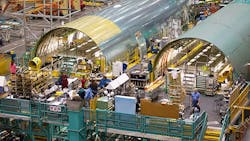Which States are Attracting Aerospace Companies?
Florida ranked first in the U.S. for aerospace and aviation manufacturing attractiveness according to a new report by PwC.
Florida is home to more than 2,000 aerospace and aviation companies that employ more than 82,000, The sector has an annual payroll impact of more than $5 billion in the state.
The 2015 Aerospace Manufacturing Attractiveness Rankings ranked states on tax rates, industry size, operating cost and education. The study also includes global rankings
The top 10 states are:
- Florida
- Michigan
- Ohio
- Utah
- Virginia
- Georgia
- New York
- Texas
- Missouri
- North Carolina
The report analyzed the rankings.
Florida maintained its #1 overall rank from the prior year. Michigan, Ohio, Texas, Georgia, and Missouri remained in the top ten. Ohio reported the #1 industry rank. Newcomers to the top ten included Utah, Virginia, New York, and North Carolina. New York had moderate rankings but was helped by an overall #1 rank in education. Virginia was #6 in taxes and #5 in education, more than offsetting higher operating costs. Utah had a strong industry rank and low taxes.
North Carolina ranked #9 in operating cost and overall competitive in other metrics. California fell out of our top ten list. California ranks #1 in industry employment and aerospace suppliers and #4 in education but its overall rank was dragged down because it was #43 in industry growth and #46 in operating cost.
Washington State fell from #3 to #12. Washington was #7 in industry rank and #10 in education, but in the bottom half in terms of operating cost and taxes. Pennsylvania and Arizona also fell out of the top ten. Both states rank well in industry and education, but have higher operating and tax costs, particularly Pennsylvania which ranked #46 in tax cost.
The firm advises states that in order meet the challenges of the new competitive landscape, they must provide a workforce that is able to satisfy both backlog demand for aircraft and meet future demand for the next generation of more efficient, sustainable aircraft.
The group called out South Carolina for its efforts in working with Boeing, who recently located a 787 final assembly plant there, to create a state-sponsored training program and facility.
“Effective talent recruitment strategies involve collaboration among private sector, government, and educational institutions that target numerous talent issues including STEM education, relevant job skills training, and the recruitment of new talent needed to spark innovations that will produce the next generation of aircraft,” PwC says. “The industry should also take measures to lift its reputation and allure, as other industries, over the years, have pulled talent that might once have been drawn to aviation.
